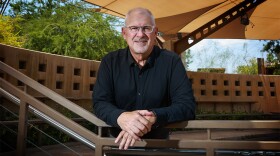Geoff Schumacher, senior director of content for The Mob Museum
Claytee White, director of UNLV’s Oral History Research Center
Geoff: Why should Las Vegans bother to familiarize themselves with our area’s history? What is it besides an interesting set of facts?
Claytee: Our local history is so powerful when it comes to a sense of how you attach yourself to the city. If you just take your time to learn about the culture and history here — to learn about the Jewish influence on the community, the African-American influence, the mob influence, all of this that makes up Las Vegas, you began to learn to engage in the city in a different way.
Geoff: And one of the most gratifying things — this was when I was promoting my book, Sun, Sin and Suburbia — was when I would talk to local people who were interested in learning about their history, or passing it on to their children. They could look in the index of the book, and they would find it uncanny how many times they would find an uncle, or a neighbor, or an aunt who played some important role in the growth of our city. And I feel like those folks in particular have now got that hook, like, “Now I care because I see that my family or somebody I know had played a part in the city.”
Claytee: And oral history allows a voice to even those of us who have no political influence or no historical influence in the usual way. We begin to see, for instance, that a maid from Fordyce, Arkansas, has memories of this city in a way that no one else does. So you learn about the power structure from behind the scenes, and those stories become as important in Las Vegas history as the stories from the owners of the casinos.
Geoff: That’s something you may not get into in a bigger city like New York or Chicago, where it’s very unlikely that your uncle or your dad or grandfather is going to be in an index of the city’s history. In Las Vegas, the odds are fairly good because of the nature of how we grew, and how small we were, and how quickly we grew. The people who came here were builders in more than one sense.
Claytee: You know, when we put together an oral history project, it’s amazing to see the pattern linking people together — for instance, how a U.S. senator is linked with a maid who started a welfare rights movement.
Geoff: Because you’re a historian, how would you say your experience of everyday life in Las Vegas is different from that of other people?
Claytee: I live a life that is interesting, challenging! I may sit down with a person today who was a doctor in the early years of Las Vegas; tomorrow, it might be Senator Harry Reid; the next day, it could be a school teacher who taught here in the 1950s. It could be the first African-American cocktail waitress at Caesars Palace. It is just amazing, the people I get to talk to.
Geoff: For me, it enlivens the experience of the mundane. The world, the mundane, for me becomes interesting. When I’m driving down the road, I see that history and I think about it as I’m going along — “These people used to own this, or they had a protest march right there.” Or even, “That’s where the Red Rock Theaters used to be, that’s where the Montgomery Ward used to be, or remember Wonder World?” Where I work, of course, is a historic building, but even before that, it was Block 17, the original African-American area of Las Vegas, and it was where the fairgrounds were. Some good things happened in that area, and some not so good things happened there. Many people can drive along Stewart Avenue and have no historical context at all. I always want to slow down and take it all in. Being a historian makes this a more enjoyable place to live.
Claytee: Is that sense of history important to your identity as a Las Vegan?
Geoff: I think so. I’m not a native Las Vegan, but for me, Las Vegas is the place I’ve lived longer than anywhere else, and it’s the place I’ve certainly studied the closest as a journalist and a historian. As a historian, it’s helped cement me in the community, and it’s part of my identity, because people now turn to me —
as they do, I’m sure to you — to learn about their city, and maybe I can do my small part to make people feel more comfortable here.
Claytee: The moment I felt like a true Las Vegan happened when I first called UNLV to inquire about pursuing a master’s degree. At my age, as a nontraditional student, I wanted to know if I could be comfortable in an environment with students 19 and 20 years old. And here I am a little over 40, let’s say. So I got to know professors, and was invited into the history department in a way that I did not expect. The classes were exciting, and then we had an oral history project on women in gaming and entertainment that we were going to work on as students. We got to go into the community. It changed me forever. To get to know people who talked about this city in a way that I could have never learned. And I just became part of the city. I wanted to know more and more and more. That changed all of us in that class, I think. And many of us are still friends today.








